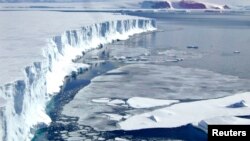Human-made sound in the world’s oceans, such as ship noise or seismic testing, may interfere with marine animals’ ability to use sound effectively for essential navigation and communication. Researchers collecting audio recordings in the Antarctic Weddell Sea have discovered that a melting iceberg can be a massive source of natural sound - in this case as loud as a magnitude-4 earthquake.
The sound can be mistaken as a stringed instrument like a double bass, or maybe some kind of truck on the highway. But it actually is an iceberg, in the Antarctic Weddell Sea, grinding slowly against the seafloor.
“The iceberg is essentially scraping along and more or less resonating, kind of like a tuning fork,” explained Robert Dziak of Oregon State University.
Dziak led a team of scientists monitoring a collection of underwater microphones around the Antarctic Peninsula, the northernmost part of the southern continent. They detected the sounds of an iceberg being born, as it cracked off the ice of the mainland. “It’s big. It’s about 25 by 50 kilometers in dimension, length and width. So it’s essentially a little floating island out there that’s moving around in the Southern Ocean.”
Over the course of its life, from its calving to its journey toward warmer seas to its eventual melting, the iceberg was never out of range of the team’s microphones.
"We saw from the beginning to its actual eventual death, for lack of a better word,” he stated.
Dziak believes this is the first time anyone has listened to a single iceberg for its entire life. And what his team heard when the iceberg floated into the warmer Scotia Sea was astonishing.
“As it begins to enter warmer water, it begins to melt. And it can melt catastrophically,” he said. “The sound of this iceberg breaking apart was incredibly loud, equivalent to several hundred supertankers in noise level.”
That’s as loud as a small earthquake, Dziak said, loud enough to resonate all the way up to the equator.
The oceanographers wondered if this much noise could pose a problem for marine animals, which use sound to navigate, communicate and find food. Bioacoustician Chris Clark of Cornell University studies the effect of underwater sound on ocean life.
“Whales, and fishes, as a matter of fact, and now even all the invertebrates, like the lobsters and the shrimp and crabs and things like that, are all paying attention to sound,” said Clark. “There’s been this increasing awareness and concern about noise in the ocean - is it good, is it bad, are we indifferent, what’s going on?”
Human-created sound in the ocean is on the rise, from increased shipping traffic, seismic testing and military sonar, and researchers are demonstrating more and more that ocean life is being affected. The noise, Clark said, can make it impossible for animals to hear the things they need to hear in order to live.
“We refer to it as acoustic bleaching,” explained Clark. “It’s as though suddenly there’s a big fog bank that just comes into where you’re living and suddenly you can’t see very far, only in this case the fog bank is noise.”
But Clark said that temporary, natural sounds - like an iceberg cracking apart, though they may be as loud as an earthquake - are probably not nearly as harmful to marine life as manmade sounds. “It’s one thing to have evolved over 5 or 6 million years in a world that’s dynamic, with storms, with ice. The human-generated noise in the ocean is so chronically persistent, it’s now a real concern, and it dwarfs collective noise generated by icebergs,” he said.
Still, researchers say this is a time of warming oceans. Climate change may lead to more polar ice breaking apart, and shattering loud like earthquakes in the Southern seas.
The sound can be mistaken as a stringed instrument like a double bass, or maybe some kind of truck on the highway. But it actually is an iceberg, in the Antarctic Weddell Sea, grinding slowly against the seafloor.
“The iceberg is essentially scraping along and more or less resonating, kind of like a tuning fork,” explained Robert Dziak of Oregon State University.
Dziak led a team of scientists monitoring a collection of underwater microphones around the Antarctic Peninsula, the northernmost part of the southern continent. They detected the sounds of an iceberg being born, as it cracked off the ice of the mainland. “It’s big. It’s about 25 by 50 kilometers in dimension, length and width. So it’s essentially a little floating island out there that’s moving around in the Southern Ocean.”
Over the course of its life, from its calving to its journey toward warmer seas to its eventual melting, the iceberg was never out of range of the team’s microphones.
"We saw from the beginning to its actual eventual death, for lack of a better word,” he stated.
Dziak believes this is the first time anyone has listened to a single iceberg for its entire life. And what his team heard when the iceberg floated into the warmer Scotia Sea was astonishing.
“As it begins to enter warmer water, it begins to melt. And it can melt catastrophically,” he said. “The sound of this iceberg breaking apart was incredibly loud, equivalent to several hundred supertankers in noise level.”
That’s as loud as a small earthquake, Dziak said, loud enough to resonate all the way up to the equator.
The oceanographers wondered if this much noise could pose a problem for marine animals, which use sound to navigate, communicate and find food. Bioacoustician Chris Clark of Cornell University studies the effect of underwater sound on ocean life.
“Whales, and fishes, as a matter of fact, and now even all the invertebrates, like the lobsters and the shrimp and crabs and things like that, are all paying attention to sound,” said Clark. “There’s been this increasing awareness and concern about noise in the ocean - is it good, is it bad, are we indifferent, what’s going on?”
Human-created sound in the ocean is on the rise, from increased shipping traffic, seismic testing and military sonar, and researchers are demonstrating more and more that ocean life is being affected. The noise, Clark said, can make it impossible for animals to hear the things they need to hear in order to live.
“We refer to it as acoustic bleaching,” explained Clark. “It’s as though suddenly there’s a big fog bank that just comes into where you’re living and suddenly you can’t see very far, only in this case the fog bank is noise.”
But Clark said that temporary, natural sounds - like an iceberg cracking apart, though they may be as loud as an earthquake - are probably not nearly as harmful to marine life as manmade sounds. “It’s one thing to have evolved over 5 or 6 million years in a world that’s dynamic, with storms, with ice. The human-generated noise in the ocean is so chronically persistent, it’s now a real concern, and it dwarfs collective noise generated by icebergs,” he said.
Still, researchers say this is a time of warming oceans. Climate change may lead to more polar ice breaking apart, and shattering loud like earthquakes in the Southern seas.










